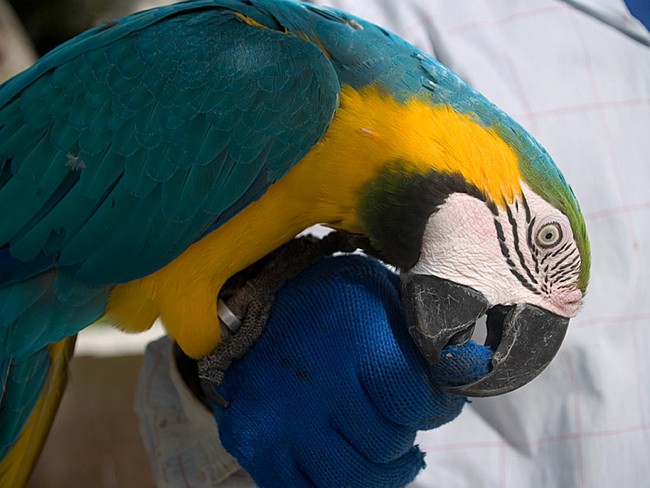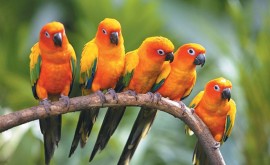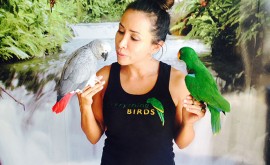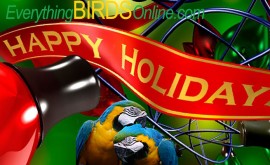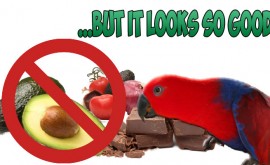 In this story shared by a customer of mine who we have groomed a beautiful and sweet African grey parrot (CAG) for years and we would talk gently to the bird while wrapping him in a towel to clip both feathers and nails.
In this story shared by a customer of mine who we have groomed a beautiful and sweet African grey parrot (CAG) for years and we would talk gently to the bird while wrapping him in a towel to clip both feathers and nails.
Throughout all the time together, this bird never tried to bite me so when the parrot’s owner said he was biting, I was surprised. So I then asked the owner what was happening to make the bird bite to which the owner responded, “nothing”.
In reality, parrots never bite without reason although they will bite for reasons often not understood by humans.
As I continued to question the owner and come to find out, she was bit most often while being petted. I also discovered that the bird was pushing the owner’s hand away during petting. My bird Rebel does this to me, not very often but when he’s tired and has had enough love he gently takes my finger into his beak and pushes it away. This occurred several times before the bird would finally bite my customer. I then asked what the owner did after getting bit to which she replied she simply left the room.
One problem identified is that her CAG was trying to provide his owner with a nice warning but she was not paying attention. Even after making several gestures to stop the petting, the owner continued. The second problem was that by leaving the room after getting bitten, the owner was sending her parrot a clear message that the bird’s opinions did not matter.
So let’s talk about the “ABC” approach of applied behavior analysis. For this, A equals Antecedent or what happens after the initial target behavior, B is the target, and C stands for the consequence of reason for the continuing behavior. By applying the ABC formula to this situation, the owner gained tremendous value.
- A – Owner pets bird when he wants to be left alone
- B – Bird bites the owner
- C – Owner stops petting the parrot and walks away
In simple terms, a well-meaning owner was completely clueless and teaching a very sweet and gentle African Grey parrot that biting is the only communication being understood.
Beaks are actually used as a means of expressing feeling. Because of this, a bite does not automatically indicate likes or dislikes but instead, a way for the parrot to communicate something.
Among parrot behavior consultants, discussions have taken place for years pertaining to “taking a bite”, which means that getting bitten is just part of being a parrot owner. Although there is a small degree of truth to this, the goal is to change mentality from “surviving a bite” to “preventing a bite”, which entails finding more effective ways to successfully communicate.
Most parrots will not resort to biting once owners pay attention to body language and show more sensitivity to the bird’s feelings. Parrots are extremely sentimental and intelligent creatures and as such, they have distinct opinions. If a parrot uses its beak to push away a hand trying to pet it, he is trying to tell that person he wants to be left alone. Therefore, an owner needs to respect the parrot and take a completely different approach.
This is not to be misconstrued that parrots should never do what owners want but rather than going through daily battles over something as small as petting, it would be better to teach the bird to choose what the owner wants it to do.
Being Non-Confrontational
If a parrot bites, the owner needs to find out why. Otherwise, success in solving the problem will never happen. However, after identifying the reason, the goal is to change whatever it is that leads up to the bite in an effort to eliminate the problem.
For example, your bird always bites you when trying to get him off the kitchen counter after breakfast but the routine is that in which the next thing on the schedule is bath time, but this is not something the parrot enjoys. After the owner teaches the bird to like baths the biting will stop.
Or, you let your bird climb to the top of his cage while you get ready for work in the morning after breakfast and when you are ready to leave and for him to go back in the cage he bites you. Remember, parrots are naturally territorial and feel superior when they are above you so the owner needs to work with the companion parrot in getting him away from the cage by giving breakfast elsewhere ie; play gym or feed when you are ready to leave for work. The parrot is rewarded with something he or she enjoys and comes down for you with no confrontation or power struggles. And remember the mornings are when your birds are most hungry and are most likely to try new things so he will look forward to his dish being filled with goodies when you are ready to leave for work.
Taking Simple Approaches
There are very simple explanations for resolving what many parrot owners feel are complex. The bottom line is to stop trying to change the bird’s behavior prior to knowing the trigger for the unwanted behavior. By taking the ABC approach, analyzing the situation is much easier, making it clear what changes are necessary.

